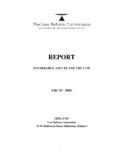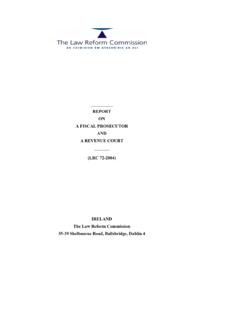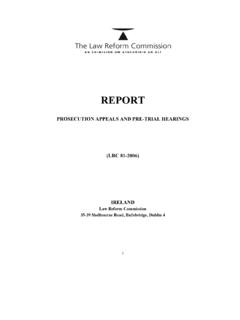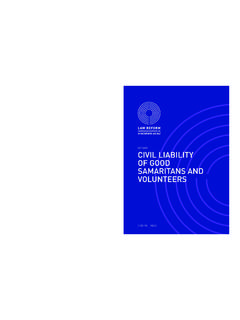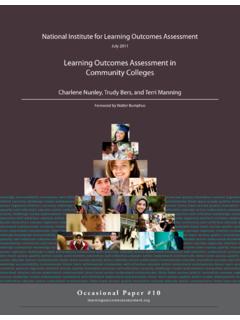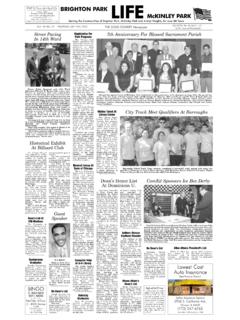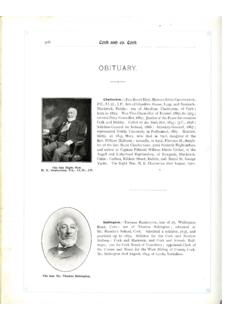Transcription of REPORT ON LAND LAW AND CONVEYANCING LAW: (7) …
1 _____ REPORT ON land LAW AND CONVEYANCING LAW: (7) POSITIVE COVENANTS OVER FREEHOLD land AND OTHER PROPOSALS _____ (LRC 70 - 2003) IRELAND The Law Reform Commission IPC House, 35-39 Shelbourne Road, Ballsbridge, Dublin 4 ii Copyright The Law Reform Commission 2003 First Published March 2003 ISSN 1393 - 3132 iii THE LAW REFORM COMMISSION Background The Law Reform Commission is an independent statutory body whose main aim is to keep the law under review and to make practical proposals for its reform. It was established on 20 October 1975, pursuant to section 3 of the Law Reform Commission Act 1975. The Commission s Second Programme for Law Reform, prepared in consultation with the Attorney General, was approved by the Government and copies were laid before both Houses of the Oireachtas in December 2000.
2 The Commission also works on matters which are referred to it on occasion by the Office of the Attorney General under the terms of the Act. To date the Commission has published sixty eight Reports containing proposals for reform of the law; eleven Working Papers; twenty one Consultation Papers; a number of specialised Papers for limited circulation; An Examination of the Law of Bail; and twenty three Reports in accordance with section 6 of the 1975 Act. A full list of its publications is contained in Appendix C to this REPORT . Membership The Law Reform Commission consists of a President, one full-time Commissioner and three part-time Commissioners. The Commissioners at present are: President The Hon Mr Justice Declan Budd High Court Commissioners Patricia T Rickard-Clarke Solicitor Dr Hilary A Delany, Barrister-at-Law Senior Lecturer in Law, Trinity college Dublin iv Professor Finbarr McAuley Jean Monnet Professor of European Criminal Justice, university college Dublin Marian Shanley Solicitor Secretary John Quirke.
3 Research Staff Legal Researchers Simon Kieron Barr LLB (Hons) BSc Claire Morrissey BCL (Int l), LLM (K U Leuven) Claire Hamilton LLB (Ling Franc), Barrister-at-Law Patricia Brazil LLB Mark O Riordan BCL, Barrister-at-Law Philip Perrins LLB, LLM (Cantab), of the Middle Temple, Barrister Darren Lehane BCL, LLM (NUI) Administration Staff Project Manager Pearse Rayel Legal Information Manager Marina Greer BA, H Dip LIS Cataloguer Eithne Boland BA (Hons), H Dip Ed, H Dip LIS v Higher Clerical Officer Denis McKenna Private Secretary to the President Liam Dargan Clerical Officers Gerry Shiel Sharon Kineen Principal Legal Researchers on this REPORT Br nagh Maher BCL, Barrister-at-Law Mark O Riordan BCL, Barrister-at-Law Contact Details Further information can be obtained from: The Secretary The Law Reform Commission IPC House 35-39 Shelbourne Road Ballsbridge Dublin 4 Telephone (01) 637 7600 Fax No (01) 637 7601 Email Website vi viiNOTE This REPORT was prepared on the basis of a reference from the Attorney General dated 6 March 1987, under section 4(2)(c) of the Law Reform Commission Act 1975.
4 The subject matter of this REPORT is also included in the Commission s Second Programme for Law Reform, which extends the Commission s involvement in this area. After extensive research and consultation with practitioners in the field, including members of the land Law and CONVEYANCING Law Working Group (described below), the Commission puts forward these proposals for reform. While these recommendations are being considered by the Department of Justice, Equality and Law Reform, informed comments or suggestions can be made to the Department, by persons or bodies with special knowledge of the subject. viii ix The land Law and CONVEYANCING Law Working Group On the 6 March 1987, the then Attorney General, in pursuance of section 4(2)(c) of the Law Reform Commission Act 1975 requested the Commission to formulate proposals for the reform of the law in a number of areas.
5 Among the topics was, CONVEYANCING law and practice in areas where this could lead to savings for house purchasers. Recognising that a comprehensive review of land law and CONVEYANCING law was not feasible within the limited resources available to it, the Commission established an expert Working Group. Broadly speaking, there are two principal aspects to the work of the expert Group. The first is to concentrate on matters giving rise to unreasonable complication and delays in the completion of CONVEYANCING transactions, and to recommend practical reforms in this regard. Secondly, the Working Group has as its aim the reform, or removal where appropriate, of anomalous or redundant land and CONVEYANCING law rules. Operating under the Commission, the Working Group draws on its expertise to direct the research of the Commission's staff and to appraise the material which they provide.
6 The current members of the Group are: Commissioner Patricia T Rickard-Clarke (Convenor) George Brady, SC John F Buckley, Solicitor (former judge of the Circuit Court) Patrick Fagan, Solicitor Ernest Farrell, Solicitor Brian Gallagher, Solicitor Mary Geraldine Miller, Barrister-at-Law Chris Hogan, land Registry Professor David Gwynn Morgan Deborah Wheeler, Barrister-at-Law Professor JCW Wylie Br nagh Maher was Secretary and Legal Researcher to the group until September 2002, when she was replaced by Mark O Riordan. The Law Reform Commission wishes to record its appreciation of the indispensable contribution which the members of this Working Group, past and present, have made and continue to make, on a voluntary basis, to the Commission s examination of this difficult x area of the law. Because of the expertise and involvement of the distinguished members of the Group, we feel justified in following our usual practice in the field of land law by publishing our recommendations straightaway as a REPORT without going through the usual stage of the Consultation Paper.
7 The Commission is most grateful to Margaret O Driscoll, Barrister-at-Law, who drafted the legislation proposed in this REPORT . Ms O Driscoll is a former member of the Office of the Parliamentary Counsel to the Government, formerly the Office of the Parliamentary Draftsman. xi TABLE OF CONTENTS INTRODUCTION ..1 CHAPTER 1 THE ENFORCEABILITY OF FREEHOLD COVENANTS ..3 Leasehold Covenants ..4 Freehold Covenants ..6 Legislative Reform ..9 Trinidad and Northern Draft Legislation ..20 CHAPTER 2 DEFINITION OF PURCHASER IN THE SUCCESSION ACT 1965 ..27 Draft Legislation ..32 CHAPTER 3 COMMORIENTES AND JOINT TENANCIES ..33 Recommendation ..35 Draft Legislation ..36 CHAPTER 4 COMPULSORY REGISTRATION AND THE IRISH CHURCH ACT 1869 ..37 The Irish Church Act 1869.
8 37 Compulsory Registration ..40 The Registration of Title Act 1964 ..41 The Need for Reform ..42 Options for Reform ..45 Draft Legislation ..48 CHAPTER 5 UNILATERAL SEVERANCE OF JOINT TENANCIES ..49 Unilateral Severance? ..51 Reform ..52 xii Unilateral Severance by Acquisition of Another Interest ..56 Summary of Draft Legislation ..58 CHAPTER 6 SECTION 126 SUCCESSION ACT 1965 (AS AMENDED): CLAIMS INVOLVING A DECEASED S Comment on case law and section 126 ..64 Possible Reform ..65 When does the right to receive a share or interest in realty accrue? ..65 Interpretation of section 126 by the courts ..67 Reform ..68 Should the Personal Representative lose the benefit of the limitation period in certain Draft Legislation ..76 CHAPTER 7 SUMMARY OF RECOMMENDATIONS.
9 77 APPENDIX A DRAFT LEGISLATION ..83 APPENDIX B PROPERTY (NORTHERN IRELAND) ORDER 1978 ..99 APPENDIX C LIST OF LAW REFORM COMMISSION PUBLICATIONS ..109 1 INTRODUCTION 1 This REPORT is concerned with six distinct areas of land law and CONVEYANCING law. Chapter 1 deals with one of the most striking anomalies in our land law, viz the issue of the enforceability of freehold covenants. The Commission examines the possible enactment of a statutory provision for the enforceability and modification of freehold covenants. 2 Chapter 2 deals with the definition of purchaser in section 3 of the Succession Act 1965. As originally enacted section 3 requires a purchaser to make all reasonable enquiries, whether buying from a personal representative of a deceased owner or from a person who has acquired the property from a personal representative by an assent.
10 This appears not to have been the intention of the promoters of the original Bill which became the Succession Act. The Commission, therefore, reviews a solution to this problem by the deletion of the words in good faith from section 3 of the Succession Act 1965. 3 Chapter 3 deals with the situation where two or more joint tenants to a property die simultaneously. The common law provides that on the non-simultaneous death of a joint tenant, that joint tenant s interest passes automatically to the surviving joint tenant or tenants. However, in cases of simultaneous death it is impossible to say which joint tenant survived the other. The Commission, therefore, examines the possibility of providing that where two or more persons have died in circumstances rendering it uncertain which of them survived the other or others, any land held by them in a joint tenancy, will be deemed to have been held under a tenancy in common, and will pass to their respective successors as under a tenancy in common.

